-
 Bitcoin
Bitcoin $87,915.1013
4.01% -
 Ethereum
Ethereum $1,626.0336
3.05% -
 Tether USDt
Tether USDt $1.0002
0.03% -
 XRP
XRP $2.1225
3.25% -
 BNB
BNB $603.9394
2.51% -
 Solana
Solana $138.6104
1.03% -
 USDC
USDC $1.0000
0.01% -
 Dogecoin
Dogecoin $0.1612
4.65% -
 TRON
TRON $0.2431
-0.84% -
 Cardano
Cardano $0.6407
4.19% -
 Chainlink
Chainlink $13.4436
2.16% -
 Avalanche
Avalanche $20.5554
5.48% -
 UNUS SED LEO
UNUS SED LEO $9.0885
-2.49% -
 Stellar
Stellar $0.2597
7.37% -
 Toncoin
Toncoin $3.0010
0.25% -
 Shiba Inu
Shiba Inu $0.0...01257
1.68% -
 Sui
Sui $2.2420
6.60% -
 Hedera
Hedera $0.1711
4.33% -
 Bitcoin Cash
Bitcoin Cash $344.5133
3.21% -
 Polkadot
Polkadot $3.9101
1.15% -
 Hyperliquid
Hyperliquid $18.1893
5.38% -
 Litecoin
Litecoin $80.0892
5.05% -
 Bitget Token
Bitget Token $4.4777
1.97% -
 Dai
Dai $1.0000
0.00% -
 Ethena USDe
Ethena USDe $0.9994
0.01% -
 Pi
Pi $0.6362
1.91% -
 Monero
Monero $214.2887
-0.67% -
 Uniswap
Uniswap $5.4298
4.03% -
 Pepe
Pepe $0.0...07950
6.54% -
 Aptos
Aptos $5.1342
2.79%
How do blockchain games achieve true scarcity of in-game assets?
Blockchain games use smart contracts and NFTs to create true scarcity, enhancing asset value and driving player engagement through limited editions and verifiable rarity.
Apr 15, 2025 at 09:49 am

Blockchain games have revolutionized the gaming industry by introducing true scarcity of in-game assets, a concept that was previously unattainable in traditional gaming environments. True scarcity refers to the limited availability of certain items or assets within a game, which can enhance their value and desirability among players. This article will explore how blockchain technology enables this scarcity, the mechanisms involved, and the impact on the gaming ecosystem.
The Role of Blockchain in Gaming
Blockchain technology is the backbone of achieving true scarcity in games. Blockchain is a decentralized ledger that records transactions across numerous computers, ensuring that once an entry is made, it cannot be altered or deleted. This immutable nature of blockchain is crucial for maintaining the scarcity of in-game assets. Unlike traditional games where servers can be manipulated to increase the supply of items, blockchain games use smart contracts to enforce strict rules about the creation and distribution of assets.
Smart Contracts and Asset Creation
Smart contracts are self-executing contracts with the terms of the agreement directly written into code. In blockchain games, smart contracts are used to create and manage in-game assets. For instance, a smart contract can dictate that only a certain number of a specific item can ever be created. Once this limit is reached, no more of that item can be produced, ensuring true scarcity. This mechanism is transparent and verifiable by anyone on the blockchain, adding an extra layer of trust and authenticity.
Tokenization of In-Game Assets
Tokenization is another key aspect of achieving true scarcity in blockchain games. In-game assets are converted into non-fungible tokens (NFTs), which are unique digital assets that cannot be replicated. Each NFT has distinct characteristics and metadata, making it one-of-a-kind. By tokenizing assets, games ensure that each item is unique and its ownership can be tracked on the blockchain. This process not only creates scarcity but also allows players to trade these assets on secondary markets, further enhancing their value.
Limited Edition Releases and Events
Blockchain games often leverage limited edition releases and special events to create scarcity. Developers may release a limited number of unique items or characters during specific events, which can only be obtained during that period. These limited releases are recorded on the blockchain, ensuring that no more of these items can be created after the event ends. This strategy not only drives engagement but also creates a sense of urgency and exclusivity among players.
Proof of Ownership and Rarity
One of the most significant advantages of blockchain games is the ability to prove ownership and rarity of in-game assets. Each asset on the blockchain has a unique identifier, and its ownership history is transparently recorded. This allows players to verify the rarity of an item and its authenticity. For example, if an item is one of only ten ever created, players can check the blockchain to confirm this rarity, adding to its value and desirability.
Impact on Player Economy
The introduction of true scarcity in blockchain games has a profound impact on the player economy. Scarcity can drive up the value of in-game assets, making them highly sought after. Players can earn, trade, and even sell these assets for real-world currency, creating a vibrant economy within the game. This economic model incentivizes players to engage more deeply with the game, as their time and effort can translate into tangible rewards.
Challenges and Considerations
While blockchain games offer the promise of true scarcity, there are also challenges to consider. Ensuring the security of smart contracts is paramount, as vulnerabilities can be exploited to create more assets than intended. Additionally, the environmental impact of blockchain technology, particularly those using proof-of-work consensus mechanisms, is a concern for many in the gaming community. Developers must balance the benefits of true scarcity with these considerations to create a sustainable and secure gaming environment.
Integration with Traditional Gaming
The concept of true scarcity in blockchain games is also influencing traditional gaming. Some developers are exploring hybrid models that incorporate elements of blockchain technology while maintaining the familiar gameplay of traditional games. By integrating blockchain for asset management and scarcity, these games can offer players the best of both worlds, combining the engagement of traditional gaming with the economic benefits of blockchain.
Frequently Asked Questions
Q: Can true scarcity in blockchain games lead to inflation of asset prices?
A: Yes, true scarcity can drive up the value of in-game assets due to high demand and limited supply. However, developers must carefully manage the release of assets to prevent extreme inflation, which could negatively impact the game's economy.
Q: How do blockchain games handle the loss of in-game assets?
A: In blockchain games, the loss of assets can be permanent due to the immutable nature of the blockchain. However, some games implement recovery mechanisms through smart contracts or allow players to purchase insurance for their assets to mitigate this risk.
Q: Are there any regulatory concerns with true scarcity in blockchain games?
A: Yes, regulatory bodies are increasingly scrutinizing blockchain games, particularly regarding the trading of in-game assets for real-world currency. Developers must navigate these regulations to ensure compliance while maintaining the integrity of true scarcity.
Q: Can true scarcity in blockchain games be manipulated by developers?
A: While the blockchain itself is secure, the smart contracts that govern asset creation can be vulnerable to manipulation if not properly audited and secured. Developers must prioritize security to prevent unauthorized changes to asset scarcity.
Disclaimer:info@kdj.com
The information provided is not trading advice. kdj.com does not assume any responsibility for any investments made based on the information provided in this article. Cryptocurrencies are highly volatile and it is highly recommended that you invest with caution after thorough research!
If you believe that the content used on this website infringes your copyright, please contact us immediately (info@kdj.com) and we will delete it promptly.
- Atok Partners with Bitgert to Advance Infrastructure and Advertising Economy in Web3 World
- 2025-04-21 23:00:13
- Pi Network (PI) Coin Could Be the Next Cryptocurrency to Launch an Exchange Traded Fund (ETF)
- 2025-04-21 23:00:13
- Strategy, the world's largest corporate Bitcoin holder, has purchased 6,556 BTC for $555.8 million
- 2025-04-21 22:55:13
- Bitcoin (BTC) Price Prediction: Arthur Hayes Hints at a Final Opportunity to Buy BTC Under $100K
- 2025-04-21 22:55:13
- Binance Adds ZORA to Spotlight Projects on Binance Alpha Alongside Other Names
- 2025-04-21 22:50:12
- Bitcoin (BTC) Price Prediction: BTC Surges Nearly 5%
- 2025-04-21 22:50:12
Related knowledge
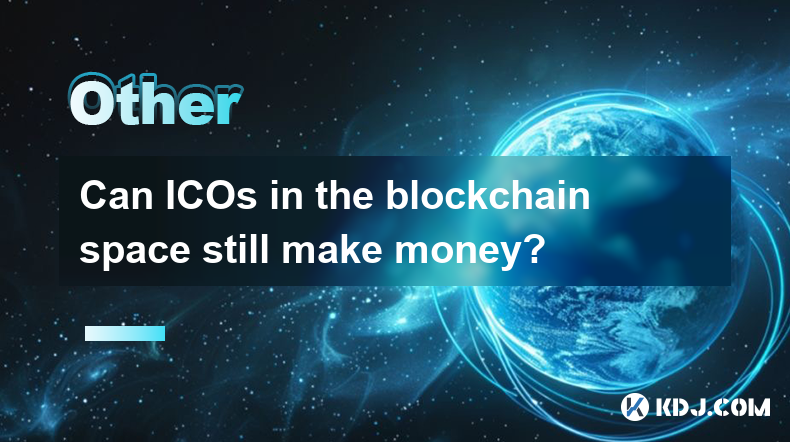
Can ICOs in the blockchain space still make money?
Apr 17,2025 at 08:29pm
The landscape of Initial Coin Offerings (ICOs) in the blockchain space has evolved significantly since their peak in 2017 and 2018. Despite the increased regulatory scrutiny and the rise of alternative fundraising methods like Security Token Offerings (STOs) and Initial Exchange Offerings (IEOs), ICOs can still be a viable way to raise funds and generat...
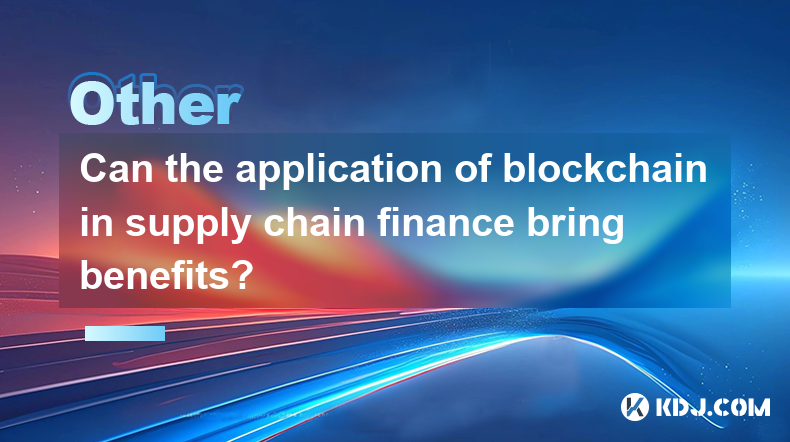
Can the application of blockchain in supply chain finance bring benefits?
Apr 15,2025 at 04:00pm
Can the application of blockchain in supply chain finance bring benefits? The integration of blockchain technology into supply chain finance has garnered significant attention in the cryptocurrency and financial sectors. This article explores how blockchain can potentially revolutionize supply chain finance, detailing its benefits and providing a compre...

Does the ranking of Chinese blockchain apps include cross-chain applications?
Apr 14,2025 at 04:00pm
The ranking of Chinese blockchain apps is a comprehensive evaluation that takes into account various aspects such as user base, transaction volume, and technological innovation. A pertinent question arises regarding whether these rankings include cross-chain applications. Cross-chain applications, which allow different blockchain networks to interact an...
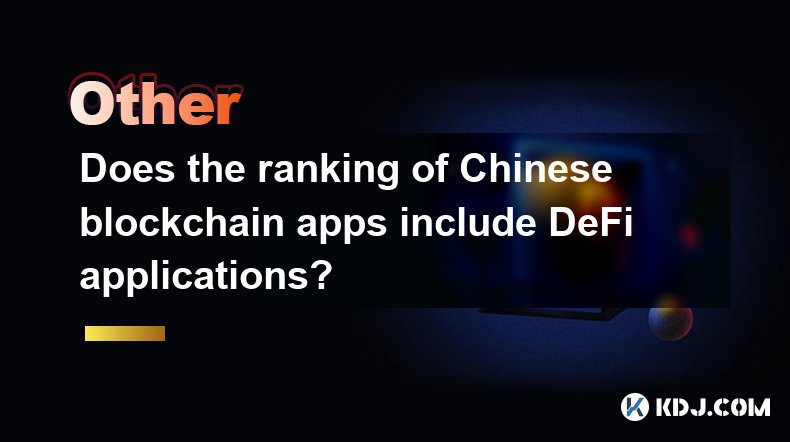
Does the ranking of Chinese blockchain apps include DeFi applications?
Apr 15,2025 at 06:57am
The ranking of Chinese blockchain apps is a comprehensive list that showcases the most popular and influential applications within the cryptocurrency ecosystem. One question that often arises is whether these rankings include DeFi applications. To answer this, we need to delve into the specifics of how these rankings are compiled and what types of appli...
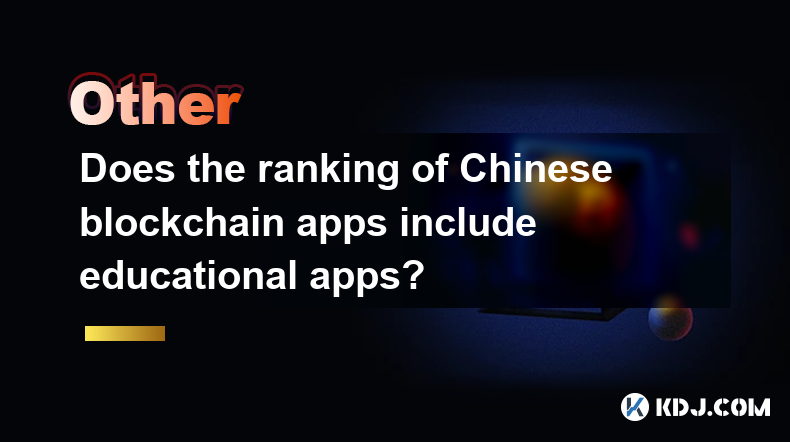
Does the ranking of Chinese blockchain apps include educational apps?
Apr 16,2025 at 03:35am
The ranking of Chinese blockchain apps often includes a variety of categories, from finance and gaming to social networking and beyond. One question that frequently arises is whether these rankings include educational apps. To address this, we need to delve into the specifics of how blockchain apps are categorized and ranked in China, and whether educat...
Does the ranking of Chinese blockchain apps include enterprise-level applications?
Apr 15,2025 at 06:42am
The ranking of Chinese blockchain apps often includes a variety of applications, ranging from consumer-focused to enterprise-level solutions. Understanding the scope and criteria for these rankings is essential to determine if enterprise-level applications are included. This article delves into the specifics of how Chinese blockchain app rankings are co...

Can ICOs in the blockchain space still make money?
Apr 17,2025 at 08:29pm
The landscape of Initial Coin Offerings (ICOs) in the blockchain space has evolved significantly since their peak in 2017 and 2018. Despite the increased regulatory scrutiny and the rise of alternative fundraising methods like Security Token Offerings (STOs) and Initial Exchange Offerings (IEOs), ICOs can still be a viable way to raise funds and generat...

Can the application of blockchain in supply chain finance bring benefits?
Apr 15,2025 at 04:00pm
Can the application of blockchain in supply chain finance bring benefits? The integration of blockchain technology into supply chain finance has garnered significant attention in the cryptocurrency and financial sectors. This article explores how blockchain can potentially revolutionize supply chain finance, detailing its benefits and providing a compre...

Does the ranking of Chinese blockchain apps include cross-chain applications?
Apr 14,2025 at 04:00pm
The ranking of Chinese blockchain apps is a comprehensive evaluation that takes into account various aspects such as user base, transaction volume, and technological innovation. A pertinent question arises regarding whether these rankings include cross-chain applications. Cross-chain applications, which allow different blockchain networks to interact an...

Does the ranking of Chinese blockchain apps include DeFi applications?
Apr 15,2025 at 06:57am
The ranking of Chinese blockchain apps is a comprehensive list that showcases the most popular and influential applications within the cryptocurrency ecosystem. One question that often arises is whether these rankings include DeFi applications. To answer this, we need to delve into the specifics of how these rankings are compiled and what types of appli...

Does the ranking of Chinese blockchain apps include educational apps?
Apr 16,2025 at 03:35am
The ranking of Chinese blockchain apps often includes a variety of categories, from finance and gaming to social networking and beyond. One question that frequently arises is whether these rankings include educational apps. To address this, we need to delve into the specifics of how blockchain apps are categorized and ranked in China, and whether educat...

Does the ranking of Chinese blockchain apps include enterprise-level applications?
Apr 15,2025 at 06:42am
The ranking of Chinese blockchain apps often includes a variety of applications, ranging from consumer-focused to enterprise-level solutions. Understanding the scope and criteria for these rankings is essential to determine if enterprise-level applications are included. This article delves into the specifics of how Chinese blockchain app rankings are co...
See all articles






















































































